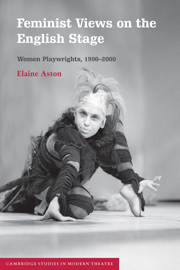Book contents
- Frontmatter
- Contents
- Acknowledgements
- 1 A feminist view on the 1990s
- 2 Telling feminist tales: Caryl Churchill
- 3 Saying no to Daddy: child sexual abuse, the ‘big hysteria’
- 4 Girl power, the new feminism?
- 5 Sarah Kane: the ‘bad girl of our stage’?
- 6 Performing identities
- 7 Feminist connections to a multicultural ‘scene’
- 8 Feminism past, and future? Timberlake Wertenbaker
- 9 Tales for the twenty-first century: final reflections
- Notes
- Bibliography
- Index
2 - Telling feminist tales: Caryl Churchill
Published online by Cambridge University Press: 22 September 2009
- Frontmatter
- Contents
- Acknowledgements
- 1 A feminist view on the 1990s
- 2 Telling feminist tales: Caryl Churchill
- 3 Saying no to Daddy: child sexual abuse, the ‘big hysteria’
- 4 Girl power, the new feminism?
- 5 Sarah Kane: the ‘bad girl of our stage’?
- 6 Performing identities
- 7 Feminist connections to a multicultural ‘scene’
- 8 Feminism past, and future? Timberlake Wertenbaker
- 9 Tales for the twenty-first century: final reflections
- Notes
- Bibliography
- Index
Summary
Caryl Churchill has the longest playwriting career of any of the writers profiled in this volume. For many years, she was one of only two contemporary women playwrights in the English theatre to receive critical and scholarly attention (the other was Pam Gems). In consequence, Churchill's theatre has been enormously important to subsequent generations of playwrights (women and men) and to the evolution of a contemporary feminist theatre practice and scholarship on the English stage and in the theatre academy.
Where several of the playwrights covered in this volume do not necessarily see themselves as feminist writers especially, Churchill is someone whose playwriting career and political outlook have consciously been shaped by a continuing commitment to feminism and to socialism. Socialism and feminism are not ‘synonymous’ in Churchill's view, but as she explained in an interview in the late 1980s, ‘I feel strongly about both and wouldn't be interested in a form of one that didn't include the other’. Her stage plays from the 1970s and 1980s are centrally concerned, therefore, with theatricalising a socialist and feminist critique of the injustices and inequalities produced by late twentieth-century western capitalism and patriarchy. Historicising the past in the interests of the present, she sought to make visible the politics of power and of social control: the regulation of sexuality (Cloud Nine, 1979), land (Light Shining, 1976), property (Owners, 1982) and punishment (Soft Cops, 1984).
- Type
- Chapter
- Information
- Feminist Views on the English StageWomen Playwrights, 1990–2000, pp. 18 - 36Publisher: Cambridge University PressPrint publication year: 2003



